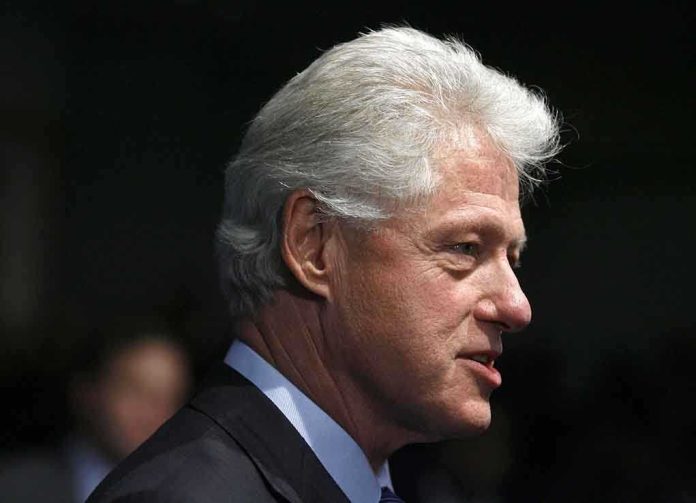
Bill Clinton’s unexpected public praise for Donald Trump’s Gaza peace deal shattered political tradition and left a nation asking: What does true leadership look like when history demands common ground?
Story Snapshot
- Bill Clinton and top Democrats gave rare bipartisan credit to President Trump for brokering a ceasefire and hostage release in Gaza.
- Trump’s 20-point plan, backed by regional actors, secured the freedom of the last 20 living hostages held by Hamas.
- Prominent political rivals and presidents issued coordinated statements of support after years of division on Middle East policy.
- The ceasefire’s success may set a new precedent for U.S.-led diplomacy and reshape domestic political calculations.
Bipartisan Praise for an Unlikely Peace Broker
On October 13, 2025, the world watched as Hamas released the final 20 hostages from Gaza, ending a harrowing chapter of the conflict. Yet what truly stunned political observers was not the mechanics of the deal, but the unprecedented chorus of praise from Democrats for Donald Trump. Bill Clinton’s statement—“President Trump and his administration, Qatar, and other regional actors deserve great credit for keeping everyone engaged until the agreement was reached”—signaled a rare moment of unity, echoed by Chuck Schumer, Hillary Clinton, and Kamala Harris. This was not mere political theater. In the fraught history of the Israeli-Palestinian conflict, American leaders rarely cross the aisle to acknowledge a rival’s triumph, especially on such a polarizing issue.
Clinton’s words reverberated beyond Washington, as families in Israel celebrated the safe return of loved ones. The deal’s success lay not only in the ceasefire, but in the optics of humility and shared accomplishment. The magnitude of bipartisan recognition hinted at a recalibration of American foreign policy discourse, with the possibility that, when the stakes are highest, partisanship can yield to principle—at least temporarily.
Behind the Breakthrough: Negotiation, Leverage, and Regional Dynamics
The origins of the deal trace back to late September, when the Trump administration unveiled a detailed 20-point plan aimed at ending months of violence in Gaza. The plan, notable for its clarity and focus, outlined steps for de-escalation, humanitarian aid, and ultimately, the release of hostages. Unlike previous diplomatic efforts, this strategy emphasized leveraging U.S. relationships with Qatar and Egypt, two nations with unique channels to Hamas. American envoys worked feverishly to build consensus, capitalizing on mounting international pressure and a deteriorating humanitarian situation in Gaza. As negotiations intensified in early October, the U.S. positioned itself not just as an outside broker, but as a linchpin for regional actors seeking stability, international credibility, and relief for Gaza’s civilians.
By the time Hamas agreed to free the remaining hostages, a complex web of interests had aligned. For Israel, the return of hostages and cessation of rocket fire were non-negotiable. For Hamas, the promise of aid and concessions was essential. For the U.S., success meant both humanitarian relief and a diplomatic win that transcended party lines. The result was a deal as much about power dynamics as principle—one that would not have been possible without the coordinated engagement of rivals and allies alike.
Political Rivals, Unlikely Allies: What Bipartisan Consensus Reveals
Clinton’s public praise, echoed by Hillary Clinton, Schumer, and Harris, was no accident. The statements were carefully crafted, signaling to the American public that, despite fierce political differences, there are moments that demand unity. For years, U.S. policy on Israel and Palestine has been a wedge issue, weaponized during elections and media cycles. Yet the Gaza ceasefire forced a reconsideration. Analysts suggest that such bipartisan applause is as rare as it is meaningful—proof that leadership can be measured by the willingness to give credit where it’s due, even to a political adversary.
Some skeptics argue this moment of unity is fragile, a product of extraordinary circumstances rather than a new norm. Yet the symbolism remains powerful. In the short term, the deal has provided immediate relief: families reunited, violence abated, and aid flowing into a battered Gaza. In the longer view, the episode may reset expectations for American diplomacy, demonstrating that broad-based coalitions are sometimes necessary to end cycles of conflict.
Ramifications: New Precedents and Unanswered Questions
The implications of the Gaza peace deal reach far beyond the Middle East. Domestically, bipartisan support for a major Trump-led initiative has already altered the political landscape. With U.S. elections looming, Democrats’ willingness to acknowledge Trump’s achievement could temper partisan rhetoric and refocus debates on results rather than ideology. For the region, the deal may serve as a blueprint for future negotiations, particularly where U.S. leverage and regional partnerships are essential. Yet experts caution that the underlying causes of the Israeli-Palestinian conflict remain unresolved. Human rights organizations, while welcoming the ceasefire, urge ongoing vigilance to prevent relapse into violence and to address the humanitarian needs of Gaza’s civilian population.
In the end, the Gaza ceasefire may be remembered not just for the lives it saved, but for the political walls it momentarily brought down. Whether this spirit of bipartisanship endures remains to be seen. But for one brief moment, Americans saw what happens when rivals become partners—for the sake of peace, and for history.
Sources:
Fox News: Schumer, Clinton lead Democrats in praising Trump for Israel-Hamas ceasefire deal
Fox News Video: Clinton praises Trump for peace deal



